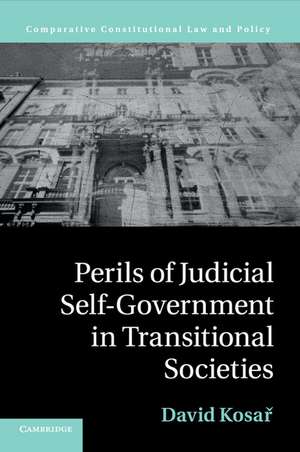Perils of Judicial Self-Government in Transitional Societies: Comparative Constitutional Law and Policy
Autor David Kosařen Limba Engleză Paperback – 10 mai 2017
| Toate formatele și edițiile | Preț | Express |
|---|---|---|
| Paperback (1) | 358.66 lei 6-8 săpt. | |
| Cambridge University Press – 10 mai 2017 | 358.66 lei 6-8 săpt. | |
| Hardback (1) | 897.32 lei 6-8 săpt. | |
| Cambridge University Press – 31 mar 2016 | 897.32 lei 6-8 săpt. |
Din seria Comparative Constitutional Law and Policy
-
 Preț: 206.77 lei
Preț: 206.77 lei - 14%
 Preț: 739.13 lei
Preț: 739.13 lei - 9%
 Preț: 696.09 lei
Preț: 696.09 lei -
 Preț: 439.01 lei
Preț: 439.01 lei -
 Preț: 280.48 lei
Preț: 280.48 lei -
 Preț: 206.84 lei
Preț: 206.84 lei -
 Preț: 367.67 lei
Preț: 367.67 lei -
 Preț: 236.43 lei
Preț: 236.43 lei - 9%
 Preț: 660.82 lei
Preț: 660.82 lei -
 Preț: 178.97 lei
Preț: 178.97 lei -
 Preț: 293.64 lei
Preț: 293.64 lei -
 Preț: 289.73 lei
Preț: 289.73 lei -
 Preț: 238.36 lei
Preț: 238.36 lei -
 Preț: 177.71 lei
Preț: 177.71 lei -
 Preț: 201.18 lei
Preț: 201.18 lei -
 Preț: 238.11 lei
Preț: 238.11 lei - 9%
 Preț: 695.78 lei
Preț: 695.78 lei -
 Preț: 319.99 lei
Preț: 319.99 lei -
 Preț: 248.39 lei
Preț: 248.39 lei -
 Preț: 283.03 lei
Preț: 283.03 lei -
 Preț: 358.48 lei
Preț: 358.48 lei - 14%
 Preț: 742.60 lei
Preț: 742.60 lei - 14%
 Preț: 727.91 lei
Preț: 727.91 lei - 23%
 Preț: 635.44 lei
Preț: 635.44 lei - 14%
 Preț: 721.78 lei
Preț: 721.78 lei -
 Preț: 283.25 lei
Preț: 283.25 lei -
 Preț: 267.18 lei
Preț: 267.18 lei -
 Preț: 284.56 lei
Preț: 284.56 lei -
 Preț: 321.31 lei
Preț: 321.31 lei -
 Preț: 385.61 lei
Preț: 385.61 lei - 14%
 Preț: 723.27 lei
Preț: 723.27 lei -
 Preț: 322.29 lei
Preț: 322.29 lei -
 Preț: 286.89 lei
Preț: 286.89 lei -
 Preț: 356.75 lei
Preț: 356.75 lei - 23%
 Preț: 701.70 lei
Preț: 701.70 lei -
 Preț: 358.48 lei
Preț: 358.48 lei
Preț: 358.66 lei
Nou
Puncte Express: 538
Preț estimativ în valută:
68.63€ • 71.98$ • 57.13£
68.63€ • 71.98$ • 57.13£
Carte tipărită la comandă
Livrare economică 02-16 aprilie
Preluare comenzi: 021 569.72.76
Specificații
ISBN-13: 9781107531048
ISBN-10: 1107531047
Pagini: 486
Ilustrații: 6 b/w illus. 32 tables
Dimensiuni: 155 x 230 x 25 mm
Greutate: 0.64 kg
Editura: Cambridge University Press
Colecția Cambridge University Press
Seria Comparative Constitutional Law and Policy
Locul publicării:New York, United States
ISBN-10: 1107531047
Pagini: 486
Ilustrații: 6 b/w illus. 32 tables
Dimensiuni: 155 x 230 x 25 mm
Greutate: 0.64 kg
Editura: Cambridge University Press
Colecția Cambridge University Press
Seria Comparative Constitutional Law and Policy
Locul publicării:New York, United States
Cuprins
Introduction; Part I. Judicial Accountability: Theoretical Framework: 1. The concept of judicial accountability; 2. Mechanisms of judicial accountability; 3. Judicial accountability and judicial councils; Part II. Holding Czech and Slovak Judges Accountable: 4. Prologue to the case studies: methodology and data reporting; 5. The Czech Republic; 6. Slovakia; 7. Evaluation: the Czech Republic and Slovakia compared; Part III. Conclusions and Implications: 8. Judicial accountability and judicial councils: critical appraisal; Annexes.
Recenzii
'Kosař … relies on more than 800 case studies from the Czech and Slovak disciplinary courts from 1993 to 2010 to analyze differing forms of accountability of the least accountable branch of government: the judiciary. The volume's first part lays the theoretical framework that informs the empirical analysis presented in chapters 4 to 7. It defines judicial accountability, describes its mechanisms, and overviews the role of judicial councils in insulating the judiciary from politics, enhancing its independence, and thus ensuring judicial accountability. Chapter 4 comments on the methodology of the empirical research, explaining case selection and case analysis, whereas chapters 5 to 7 compare cases from the Czech and Slovak Republics. The final chapter serves as a conclusion, arguing that the judicial council increases judicial autonomy without necessarily improving the independence of individual judges. Recommended.' L. Stan, Choice
'Perils of Judicial Self-Government in Transitional Societies serves as a fine cautionary tale about unforeseen consequences and about the perils of sloganizing the sophisticated semantics of constitutionalism and imposing top-down, ready-made policy solutions adopted on the basis of such slogans.' Bogdan Iancu, European Constitutional Law Review
'Kosař's thoroughly researched book is one of the most comprehensive accounts on judicial accountability written in comparative judicial scholarship, providing a solid basis for further discussions of this concept in academic circles. The book offers a springboard for future analyses on judicial accountability mechanisms and their operation, including their informal dimension, in the post-communist world and beyond.' Raul A. Sanches-Urribarri, I-CONnect (www.iconnectblog.com)
'Perils of Judicial Self-Government in Transitional Societies serves as a fine cautionary tale about unforeseen consequences and about the perils of sloganizing the sophisticated semantics of constitutionalism and imposing top-down, ready-made policy solutions adopted on the basis of such slogans.' Bogdan Iancu, European Constitutional Law Review
'Kosař's thoroughly researched book is one of the most comprehensive accounts on judicial accountability written in comparative judicial scholarship, providing a solid basis for further discussions of this concept in academic circles. The book offers a springboard for future analyses on judicial accountability mechanisms and their operation, including their informal dimension, in the post-communist world and beyond.' Raul A. Sanches-Urribarri, I-CONnect (www.iconnectblog.com)
Notă biografică
Descriere
This book investigates the mechanisms of judicial control to determine an efficient methodology for independence and accountability.
















